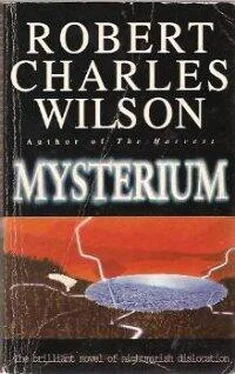Evelyn came closer without really meaning to, shocked beyond reason. The shock was purely physical, like putting your finger in a wall socket. She felt it in her arms and legs. Somebody went and hung their laundry from the lampposts, she thought, and then the world became suddenly much uglier: No… those are children. Those are dead children.
She stopped and stood for a long time looking at the dead children hanging from the lampposts outside City Hall. A delicate snow began to float down from the sky. The flakes of snow were large and perfect and they landed on the humped, frozen clothing of the dead children until the dead children were clothed all in white, a perfect unsullied purity.
A patrol car passed on the snowy street. Evelyn turned to look at the soldier who was driving, but he was hidden in the shadow of the car and had turned his head away: away from Evelyn, or away from what Evelyn had seen.
∞
She walked without a destination and after a bleak passage found herself peering up through veils of snow to the window of Dex Graham’s apartment. His light was on. The window was a yellow punctuation in the snow-scabbed brick wall. She went inside, walked up the stairs, knocked on his door.
Dex opened the door and looked at her with unconcealed surprise. Maybe he had been expecting someone else. That was natural, after so much time apart. But, seeing him, she was overwhelmed with memories that seemed terribly immediate: of his voice, his touch, his smell. There was that catalog of intimate knowledge still between them. She wasn’t entitled to it but couldn’t put if away.
He said, “Evelyn? Evelyn, what is it—are you all right?”
“I have to tell you a secret,” she said.
“We met at a bar,” Ruth Wintermeyer said. “Sounds tacky, doesn’t it? But really, we met because he’d read my book.”
She lit a cigarette, drew the smoke into her lungs, and closed her eyes a moment. After the accident at the lab, Ruth said, she had driven to the local grocery and filled a bag with cartons of cigarettes. Lately she had weaned herself to one cigarette a day—“Just a little taste of better times.” She had two packs left.
Howard Poole sat in an easy chair opposite her, too warm in his jacket but cold without it. Like everyone else, Ruth Wintermeyer was cautious about turning up her heat—as if electricity could be hoarded, too.
She said, “I’m a member of the Historical Society. I wrote a book of Peninsula history from colonial times to the Civil War. Strictly amateur scholarship. My degrees are thirty years old and my publisher doesn’t distribute east of the Great Lakes. But I guess in Two Rivers that makes me an intellectual.
“Your uncle called on the phone and we got together. He was interested in the history of the town. In a way, I think he was adopting it. He refused to live in government housing—when I met him he was renting a room at the Blue View. Very unorthodox. The government wanted him inside perimeters, but Stern wouldn’t hear of it. He was a kind of scientific celebrity and he could get away with a little prima donna behavior. I think the price of having Stern was indulging Stern.” She paused. “Not that the security people weren’t busy. When he started seeing me, suddenly there were these, you know, little men, these guys in three-piece suits parked outside the house or asking questions at the bank, checking my credit record and so forth. I guess I passed the test. I’m not much of a security risk.”
“You two were dating?”
“Does that surprise you?”
“No. It’s just that I never saw much of his personal life. To be honest, I wasn’t sure he had one.”
“A private life?”
“A romantic life. I guess I imagined he was all intellect.”
“I know what you mean. He didn’t do intimacy very well. Part of him was always detached. Howard, have you always called him Stern?”
“Everybody in the family called him Stern. Except my mother, when they were together, and even then—she called him Alan, but I didn’t sense a real connection. She said he always stood apart even as a child. The Sterns were a big family. Had a big house on Long Island. Not rich, but certainly not poor. There was some inherited money, I think.”
Ruth said, “A religious family?”
“Agnostic at best.”
“Because he talked a lot about religion.”
“He had some odd ideas.”
Ruth stubbed out her cigarette and cleared her throat. “Maybe we should talk about those odd ideas,” she said.
∞
The conversation wound into the afternoon. Ruth fed him sandwiches and coffee for lunch. (“Ground coffee from the Pine Street depot. It’s stale, and there’s more than a little chicory in it. But it’s hot.”) And as curfew approached and a new snow dappled the windows, a picture of Stern began to emerge.
Alan Stern, the outsider. The one who stood apart even in childhood. Stern the seeker. His religiosity wasn’t so mysterious, Howard thought. It was not an uncommon motivation among the scientists Howard knew, though few of them would admit it. One of the things that drew people to cosmology was the promise that the universe might yield up a secret or two… maybe even the secret; a glimpse into the hidden order of things.
But the best science is always tentative, a grope into the darkness. “That was never enough for Stern. He wanted more. He was always playing with the grand systems. In his own field, he paid attention to people like Guth and Linde, the fearless theoreticians; or else it was Hegel, Platonism, the Gnostics—”
“Oh, Gnosticism—he loved to talk about Hellenic and Christian Gnosticism. And it was genuinely interesting. I borrowed some of his books…”
“But it wasn’t just a hobby. He saw something in it.”
“Himself,” Ruth said promptly. “He saw himself in it. What would you call the basic Gnostic idea, Howard? I think it’s that there’s a secret world, that it’s hidden from us, but we can find our way to it—or hack to it, because we’re imperfect reflections of perfect souls, embedded in an imperfect world.”
“Cast out from the Pleroma,” Howard supplied. “The World of Light.”
“Yes. The Gnostics said, ‘You can find your way to this, because you’re part of it. You long for it. It’s your original true home.’ ”
Howard pictured Stern as a lonely child, perhaps too aware of his own awkwardness and great intelligence. He must have felt it keenly, that lost imperium from which he had dropped into humble matter.
“And we do live in an unholy world,” Ruth said. “He was always conscious of that. When he watched the news on TV, the wars and the starving children, he looked like he was in pain.”
Howard said, “It became an obsession.”
“Oh, at least.”
“More than that? Ruth, are you questioning his sanity?”
“I don’t want to judge. I knew him for a little more than a year, Howard. We were close. I loved him. Or I thought I did. All I can say is, during that time, he changed. Maybe something at the lab affected him. He started spending more time with his books. He picked up religious arguments everybody else abandoned centuries ago. Worse, he wanted to have these arguments with me.” She held up her hands in a helpless gesture. “I don’t have any particular faith in God. I don’t know if evil is a creative force. I worry about, you know, shopping. Or the national debt, if I’m ambitious. Not theology.”
The room was silent for a moment. Howard listened to the ticking of snow on a windowpane. He sipped coffee.
Ruth toyed with her cigarette pack but didn’t light one.
Читать дальше












